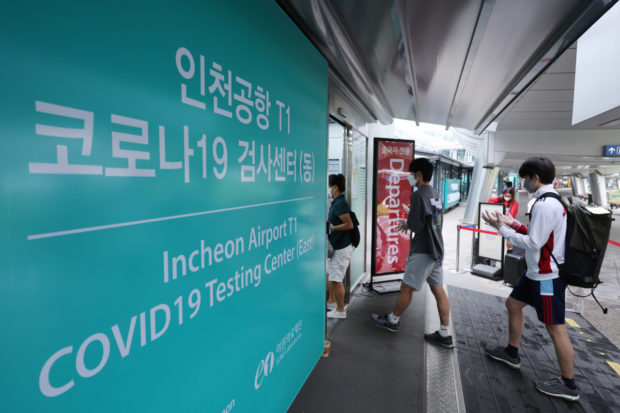Is South Korea heading toward another Omicron wave?

People line up outside a COVID-19 testing center at Incheon International Airport on Friday. (Yonhap via The Korea Herald/Asia News Network)
SEOUL — South Korea is warily eyeing its latest bump in cases as Omicron’s new and likely more elusive subvariant, BA.5, begins to dominate.
For two consecutive days on Sunday, the number of cases counted daily topped 20,000 — a mark that has not been passed since mid-May in the aftermath of the spring Omicron wave.
Over the most recent seven-day period, 17,467 cases were reported per day on average, marking a 92 percent jump from 9,092 cases seen in the prior period.
Lee Ki-il, the vice minister of health, said during a government COVID-19 response meeting ahead of the weekend that key metrics indicated a “possible arrival of a resurgence,” which he said prompted a “need for a return to more caution.”
Top health officials have identified waining immunity — both natural and vaccine-induced –, an increase in travel volume over summer holidays and, most worryingly, BA.5’s growing share as among the main risks that could bring on another wave over the summer.
Article continues after this advertisementThe Korea Disease Control and Prevention Agency’s weekly analysis of sequenced samples posted Tuesday showed the share of BA.5 in local cases climbed to 24.1 percent from just 7.5 percent seen a week ago. Nearly half or 49.2 percent of sequenced samples from arriving travelers were BA.5, Tuesday’s analysis found.
Article continues after this advertisementThe KDCA says BA.5 appears to elude prior immunity more easily compared to earlier versions of Omicron, BA.1 and BA.2, which were behind the spring wave that peaked in March at over 600,000 one-day cases.
BA.5 may be the “fastest-spreading COVID-19 variant yet,” according to Dr. Paik Soon-young, an emeritus professor of microbiology at the Catholic University of Korea.
“You will recall that BA.1, the original Omicron, already spread faster than its predecessor, delta. Then BA.2 came around, and it was spreading even faster than BA.1,” he told The Korea Herald. “Now BA.5 is said to be about 35 percent more transmissible than BA.2.”
In a May 26 pre-print, Japanese researchers noted that BA.4 and BA.5 appeared to be more pathogenic in a hamster model than BA.5.
But future waves might not be as detrimental for South Korea, more than a third of whose population has already been infected over the last Omicron wave.
Son Young-rae, a senior Ministry of Health official, told reporters Friday that “generally speaking, after a COVID-19 exposure, one’s immune system would be primed to respond to another infection.”
“The rates of severe infections and deaths are anticipated to be lower this time around if another wave should come our way,” he predicted.
On both Saturday and Sunday, 19 deaths were attributed to COVID-19 — the highest seen in about a month. There were 67 patients who were classified as having a severe to critical case as of Saturday afternoon.
Since mid-June, the number of patients requiring hospitalization has remained below 100. So far through July, nine patients were reported as having lost their lives to COVID-19 each day on average, down slightly from last month’s 12.
In a phone call with The Korea Herald, Dr. Kim Woo-joo, an infectious disease professor at Korea University, pointed out that the official figures were “highly likely to be dwarfed” due to the lack of testing.
On a daily average, from July 1-6, 83,944 tests — PCR and RAT combined — were carried out, with the test-positivity rate standing at 18.3 percent. As PCR testing is only offered to people aged 60 and above, samples from younger people were probably not being sequenced as much for variant analysis.
“Based on some lab data, BA.5 looks like it might be Omicron’s version of a delta-like aberration,” Kim said.
“Real-world data is still yet to come, but animal studies suggest BA.5 may be more immune-evasive, more transmissible and more virulent than previous Omicron variants.”
South Korea has no COVID-19-related restrictions other than the indoor face mask mandate and the 7-day isolation requirement for patients with a confirmed infection.
RELATED STORIES
South Korea’s new COVID-19 cases above 20,000 for 2nd day
South Korea’s COVID-19 cases rebound, raise concerns over summer surge
South Korea eyes post-Omicron life, mulls ending COVID-19 isolation
South Korea removes post-travel quarantines for unvaccinated
For more news about the novel coronavirus click here.
What you need to know about Coronavirus.
For more information on COVID-19, call the DOH Hotline: (02) 86517800 local 1149/1150.
The Inquirer Foundation supports our healthcare frontliners and is still accepting cash donations to be deposited at Banco de Oro (BDO) current account #007960018860 or donate through PayMaya using this link.